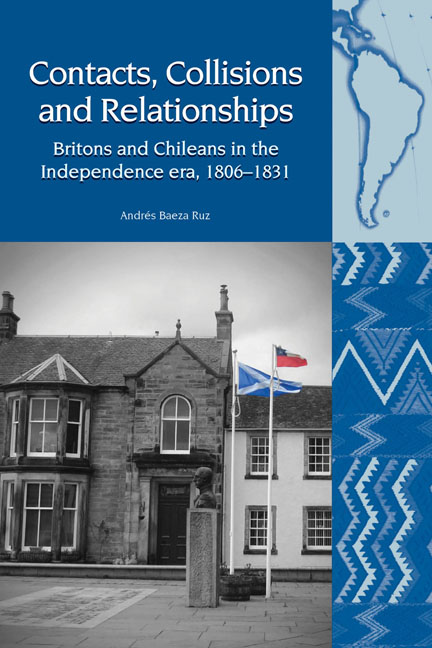Book contents
- Frontmatter
- Contents
- Acknowledgements
- Abbreviations
- Preface
- Introduction
- 1 Invasions, Negotiations and Conspiracies: British-Chilean Relations in an Era of Change, 1806–1817
- 2 Cultural Encounters Offshore: Britons and Chileans in the Chilean Navy, 1817–1823
- 3 Bibles, Schools and Citizens: British Protestant Missionaries and Educators in Chile, 1817–1831
- 4 British Merchants, Private Interests and the Fostering of Free Trade in Chile, 1811–1831
- 5 Beyond Diplomacy: The Cultural Significance of British Recognition of Chile's Independence, 1817–1831
- Conclusion
- Bibliography
- Index
5 - Beyond Diplomacy: The Cultural Significance of British Recognition of Chile's Independence, 1817–1831
- Frontmatter
- Contents
- Acknowledgements
- Abbreviations
- Preface
- Introduction
- 1 Invasions, Negotiations and Conspiracies: British-Chilean Relations in an Era of Change, 1806–1817
- 2 Cultural Encounters Offshore: Britons and Chileans in the Chilean Navy, 1817–1823
- 3 Bibles, Schools and Citizens: British Protestant Missionaries and Educators in Chile, 1817–1831
- 4 British Merchants, Private Interests and the Fostering of Free Trade in Chile, 1811–1831
- 5 Beyond Diplomacy: The Cultural Significance of British Recognition of Chile's Independence, 1817–1831
- Conclusion
- Bibliography
- Index
Summary
Introduction
Great Britain formally recognised the independence of Chile in 1831. This was the outcome of a long process of formal negotiations that began as early as 1813, when the first Chilean diplomatic envoys were sent to London to get support from Britain and to open up commercial relations. Such negotiations took place in a context of warfare both in Europe and Spanish America. The Chileans did not initially succeed in the negotiations because Britain declared its neutrality in the conflict between Spain and its colonies and refused to negotiate with Chilean envoys as representatives of a state that did not exist. There is a general assumption about the expansion of foreign policy of Great Britain during these years by formal and informal means since the nineteenth century was coincident with the most expansionist period of the British Empire (1780–1830). Also, it is generally assumed that diplomatic relations with Spanish America during this period were carried out on the grounds of the expansion of British ‘commercial interests’ around the globe and the need for merchant houses to expand their markets, which led to the configuration of a ‘public policy; based on ‘private interests’. Gabriel Paquette has added that the intellectual context of British recognition was also a crucial factor to take into account, and it can be summarised in three major points:
First, colonial monopoly was deemed unprofitable and unrestricted commerce's benefits were embraced; second, Spain's legitimacy as a colonial power was repudiated due to its unstable government, pernicious degradation, and hostility to unregulated commerce; and third, the fledgling states’ separation from Spain was justified because they accommodated British political and financial institutions.
The policy of neutrality followed by Great Britain between Spain and the insurgent colonies is also understandable. It was a context in which the British wanted to take advantage of the possibilities that the opening of free trade from the new governments, like that of Chile, could bring to Great Britain.
This is why, as has been explored and explained in the previous chapters, the relations between Britain and Chile between the declaration of neutrality in 1808 and the resumption of diplomatic negotiations from 1817 were upheld mainly by non-state actors.
- Type
- Chapter
- Information
- Contacts, Collisions and RelationshipsBritons and Chileans in the Independence era, 1806-1831, pp. 185 - 218Publisher: Liverpool University PressPrint publication year: 2019

